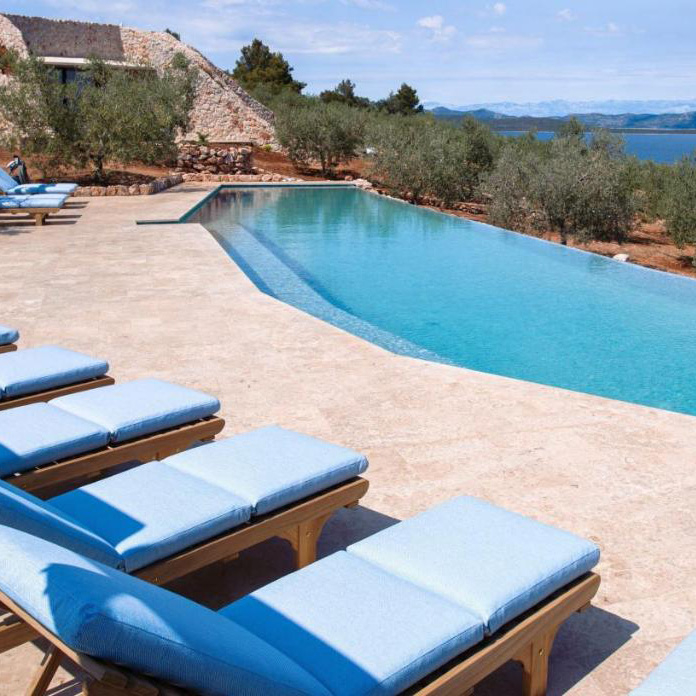It would be difficult to dream up a hotel better suited to the challenges of 2021 than the wonderfully escapist Villa Nai 3.3, which just opened on the Croatian island of Dugi Otok. Designed by architect Nikola Bašić, the hotel features eight guest rooms built into a hillside, each with a private terrace and sweeping views of the Adriatic Sea. The land’s not bad, either—the property is surrounded by a 10-acre olive grove, where some of the trees are more than 500 years old.
What’s on offer at Villa Nai 3.3 is everything that travelers crave right now: space, silence, sunshine (this is one of the sunniest places in Europe), solicitude, and sustainability. The hotel was built with stone excavated on-site, and its architecture reflects the traditional Dalmatian method of dry-stacked walls, which are built with no mortar.

A small spa offers plenty of pampering, and the views from the saltwater infinity pool are operatic. The two restaurants serve organic vegetables from the hotel’s garden alongside a local catch of the day, which is finished with the award-winning Nai 3.3 olive oil, produced at a small mill on the premises.
Break the spell of being an alone-in-the-world castaway with boat trips to three nearby national parks. Otherwise, amble through Dugi Otok’s quaint villages, where delicious meals, washed down with local wine, are served under vine-covered trellises for less than the price of a morning latte in a European capital.

Žman, a small, charming village with a harbor, is the nearest town to the hotel and has remained under the radar despite the fact that tourists are once again flocking to the craggy islands of Croatia. It’s been 30 years since Croatia declared its independence from what was then the Socialist Federal Republic of Yugoslavia, and the country has been refashioning itself into a vacationland ever since.
The Dalmatian coastline is like a Central European version of Maine, but with monokinis instead of slickers. There are yachts instead of sailboats, and olives rather than blueberries. But the two summer destinations have some things in common: both are remarkably beautiful, and both serve up succulent, locally caught lobster to eager vacationers with deep pockets.

But, unlike Maine, tourism in temperate Croatia is a year-round affair. Villa Nai 3.3’s name is a nod to this fact—nai means “snow” in the old Dalmatian language, and 3.3 is the number of inches of it that have fallen on the island during a century of winters.
In late September and October, the olive harvest is the main attraction, and guests are invited to hit the fields and pick for a while, although most will participate through oil tastings and themed dinners. Even those who don’t lift a finger will want to bring a bottle of new oil home, though. Its buttery, grassy taste has a tendency to transport one back to this special place.
Alexander Lobrano is a Paris-based writer and restaurant critic. His latest book, the gastronomic coming-of-age story My Place at the Table, is out now


